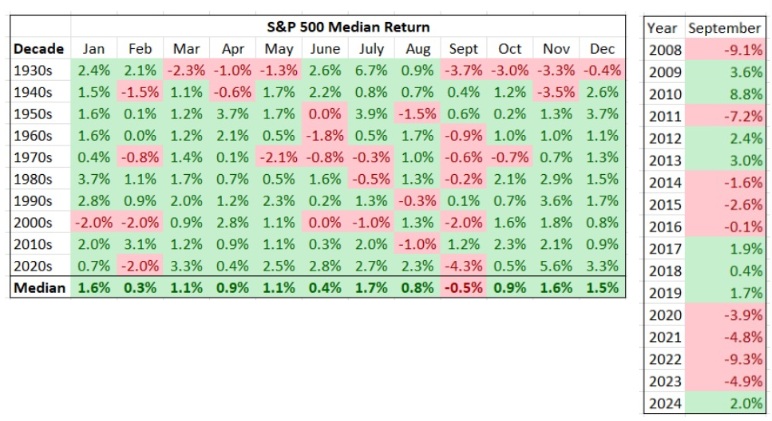Stock Prices Historically Get Sent to Detention in September
September has historically been a weak month for stocks, and this year’s sentiment will hinge on Jay Powell’s speech tomorrow at Jackson Hole
Students aren’t the only ones uneasy about September—stocks often dread it too. Historically, it’s the worst month for the market. Since 1930, the S&P 500 has fallen about 55% of the time in September, losing a median 0.5%. It doesn’t always end in the red, but the odds aren’t in investors’ favor.

Sure, one month out of twelve will, by definition, underperform. On its own, it seems irrelevant. But market trends aren’t always accidental. When enough people notice a pattern—like September historically lagging—they may act on it. And when investors collectively sell in September, prices can actually drop, making the trend real.
Jackson Hole Speech by Fed Chair Jay Powell
This year, September’s mood will hinge on what Federal Reserve Chair Jay Powell says tomorrow at the Jackson Hole symposium in Wyoming.
Once a quiet academic gathering, it’s now a key stage for Fed officials to signal monetary policy shifts. In 2010, Ben Bernanke hinted at more “quantitative easing” (money-printing to boost the economy), which lifted stocks. In 2022, Powell warned of the “pain” ahead from higher interest rates, which spooked markets.
This Friday at 10 a.m., we expect Powell to signal his intent to resume cutting rates at the next September 17 Federal Open Market Committee meeting.
Mixed Signals from the U.S Economic Data
The U.S. economy, however, is sending mixed messages.
Consumer inflation eased slightly to 2.7% last month. Furthermore, the job market is losing steam. The latest jobs report for July was weak, and the employment figures for May and June were sharply revised down by a combined total of 258,000 jobs.
Last month’s Producer Price Index, which tracks what companies pay for goods and services, unexpectedly jumped 0.9% in July—the biggest monthly rise since June 2022. This could be a sign of future price hikes for consumers, especially since a recent report from Goldman Sachs predicts companies will start passing on the costs of tariffs they’ve been absorbing up until now.
September Rate Cut Expected
Despite the mixed signals, the market expects the Fed to resume cutting interest rates. There’s currently an 85% chance of a 0.25% rate cut on September 17, with another expected to follow in December.
But, if Powell downplays these expectations at Jackson Hole, September could live up to its rough reputation.
Despite the recent surge in business costs, this seems to be a one-time event, as prices have been relatively stable in prior months. Also, even if companies start passing tariff costs on to the consumer as Goldman Sachs predicts, it may be a single price increase rather than a pattern of ongoing hikes that would lead to inflation.
For these reasons, we believe Powell will focus more on the weak jobs report. This should signal a likely rate cut in September, which would provide a good reason to avoid a market selloff next month.
-written by Jeff Pollock
DISCLAIMER: Unless otherwise noted, all publications have been written by a registered Advising Representative and reviewed and approved by a person different than its preparer. The opinions expressed in this publication are for general informational purposes only and are not intended to represent specific advice. Any securities discussed are presumed to be owned by clients of Schneider & Pollock Management Inc. and directly by its management. The views reflected in this publication are subject to change at any time without notice. Every effort has been made to ensure that the material in this publication is accurate at the time of its posting. However, Schneider & Pollock Wealth Management Inc. will not be held liable under any circumstances to you or any other person for loss or damages caused by reliance of information contained in this publication. You should not use this publication to make any financial decisions and should seek professional advice from someone who is legally authorized to provide investment advice after making an informed suitability assessment.
